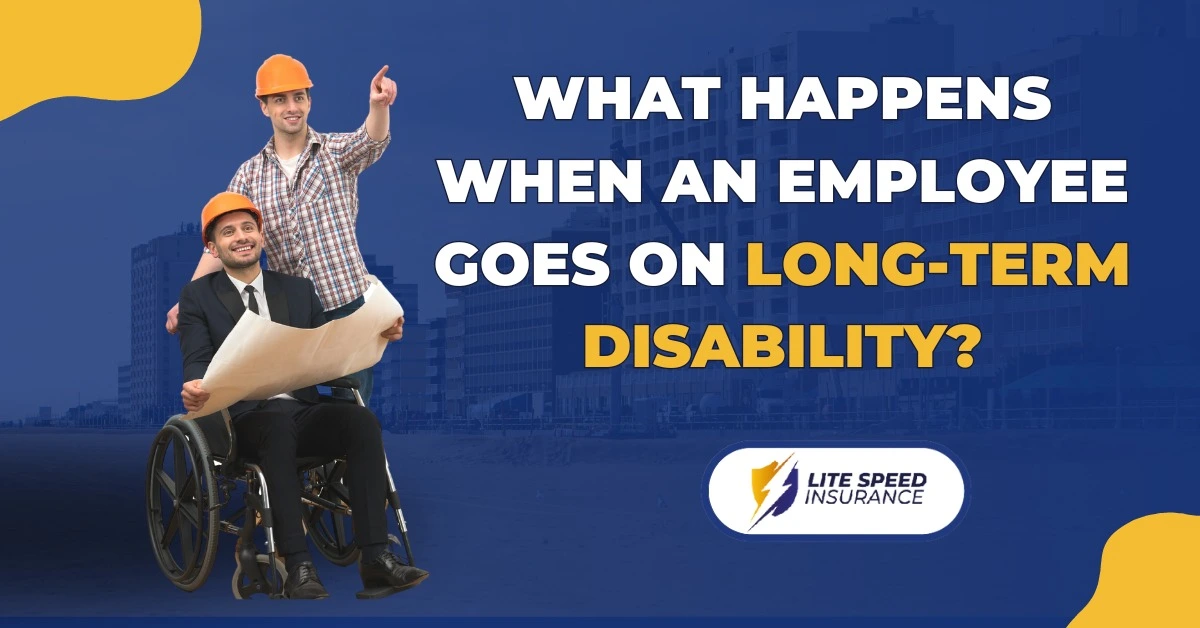When an employee is dealing with a long-term disability, it has a significant impact on the personal and professional aspects of their lives. This paper, customized for LiteSpeed Insurance Company, addresses the characteristics of long-term disability (LTD), the LTD benefits claim process, the employment consequences, and the legal protections available for disabled workers. Knowing these components assists both employers and employees in working out the intricacies of long-term disabilities in the workplace.
Understanding Long-Term Disability
Definition and Duration

An employee with a long-term disability is a person who isn’t able to do their job for a long time. Policies may differ in their definitions of LTD. However, benefits usually start after the short-term disability benefits are exhausted. They can last from 6 months to several years or until the age of retirement, depending on the policy’s specifications.
Eligibility Criteria
For an employee to be eligible for LTD benefits, he or she must generally meet the criteria such as a minimum period of continuous employment, a certain specific number of hours worked and substantial medical evidence of disability. Policies need a doctor’s attestation of disability, and the condition should be expected to last for not less than six months.
Employee Rights and Protections
Legal Protections
In the US, employees are protected from termination of their jobs by laws enacted at the state and federal levels. In the case of disability, these laws ensure their financial well-being. One of the examples includes the specific state disability acts and the overall federal regulations as well.
Work Safety and Non-discrimination Legislation
Among the most significant laws are the ADA and the FMLA, which protect employee positions and prevent disabled people from being discriminated against. These regulations, in turn, compel employers to make reasonable accommodations and offer up to 12 weeks of unpaid leave annually for severe health conditions.
Let’s more about it Employers Liability Insurance vs. Workers Compensation
The Claims Process
Initiating a Claim
The LTD claim process traditionally begins with the employee or their representative communicating to the employer and the insurance carrier about their illness through a formal notice. The next step is the accumulation or exclusion interval, which resembles a deductible.

Required Documentation
Required documentation usually includes medical records with accurate diagnosis, a statement from the doctor explaining the disability, and a job description with a clear description of why the individual can no longer fulfill his or her job responsibilities.
Approval and Denial
The claim may be granted to the claimant, and the benefits of LTD may be given, or it may be denied. Usually, the refusal is due to the lack of sufficient medical evidence or not meeting the policy’s requirements. The employee can file appeals for rejected claims, with the provision of extra documents and often with the support of a lawyer.
Impact on Employment
Benefits Continuation
Long-term disability recipients might still receive employer benefits, including health insurance, contributions to retirement plans, and other perks, primarily contingent on the employer’s policies or specific disability insurance ter
Return-to-Work Considerations
Almost all LTD policies have provisions designed to help disabled employees return to work, either doing the job in a modified manner or with modifications as their health allows.
Florida-Specific Laws for Long-term Disability
Florida Workers Workers’ Compensation for Disability
Employees with disabilities due to job injuries or health problems can qualify for benefits under Florida workers ‘ compensation law. The program offers wage benefit replacement, medical care, and vocational rehabilitation.
Florida Civil Rights Act
The Florida Civil Rights Act has similar protections as the ADA and some additional provisions specifically designed for Florida. It forbids job discrimination based on disability and requires employers to provide reasonable accommodations unless the employer’s situation is shown to be an undue hardship.
Additional State Protections
Florida law also provides supplemental protection through existing statutes parallel to federal regulations. These act to offer more coverage or specific benefits that are tailor-made to suit the needs of Florida’s workforce.
Applying for ERISA Long-Term Disability
The Employee Retirement Income Security Act (ERISA) is the most prominent law regulating private employer-offered LTD insurance plans. It is of utmost importance to have a sound knowledge of the ERISA’s strict procedural rules to provide seamless claims processing.
What Happens When Long-Term Disability is Terminated?
Does Disability Insurance Protect You from Losing a Job?
LTD insurance is there to offer financial aid, but it won’t protect your job status, which is common in the case of ADA and FMLA.
Does Disability Benefit Continue After Termination?
Concerning the policy terms, benefits can also be extended after the job ends. In addition, the employees should be well aware of the details of their policies and state laws.
Frequent Problems that May Cause Long-Term Disability
Disability of long term disability may occur as a result of different medical conditions. These frequently happen as critical injuries, chronic illnesses, including cancer or cardiovascular diseases, and mental illnesses, for instance, severe depression or anxiety. Realizing such situations will be helpful to employers and employees in designing strategies for dealing with the long-term effects on work.
The figures for Long-Term Disability Claims

The statistics show that the probability that one out of four of today’s 20-year-olds will become disabled before they reach retirement age is relatively high. In Florida, the amount of long-term disability claims has risen in the last couple of years, just like in the country. These statistics can help stakeholders understand the scale of the consequences of LTD on the environment and the need for good insurance coverage.
Laws Protecting Disabled Employees
The ADA requires employers to provide reasonable accommodations in the workplace and prohibits employers from discriminating against disabled workers. The FMLA law allows for 12 weeks of unpaid leave in the case of severe medical conditions and job security during such time.
LiteSpeed Insurance Services
LiteSpeed Insurance Company is an LTD insurance provider that offers an insurance policy tailored to the different needs of the workplace. Hence, employers and employees are shielded from the vagaries of long-term disabilities.
Conclusion
Being knowledgeable about the subtleties of long-term disability, as well as the legal and employment issues that are associated with it, is critical. The problem of long-term disabilities can be effectively dealt with if the workers are well-informed and prepared, and this will ensure that the employees in Florida and beyond are stabilized and supported.




